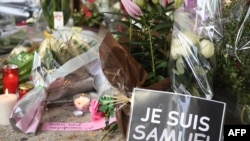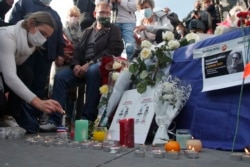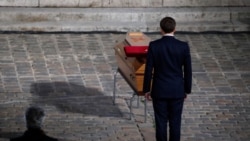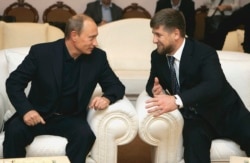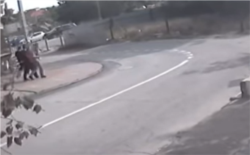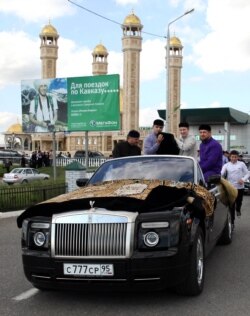On October 17, head of Chechnya Ramzan Kadyrov posted a statement on his Telegram channel regarding the previous day’s deadly attack in France, where, according to law enforcement, a Chechen teenager had beheaded a teacher for demonstrating caricatures of Prophet Muhammed to his students.
Kadyrov is well-known for his brutal treatment of all dissent, and Chechnya has been a crucible for persecution of LGBTQ+ persons. The U.S. State Department’s human rights report for 2019 summarizes many of the allegations against Chechen authorities. In July 2020, Secretary of State Mike Pompeo issued sanctions on Kadyrov and his family, citing “gross violations of human rights.”
Yet Kadyrov, responding to the beheading, criticized France.
“This is not the first time when France attempts to blame all its problems on the Chechens. I assure you all, Chechens have nothing to do with it,” Kadyrov wrote in a statement on the killing.
“This tragedy forces to think about how the French society, speaking of democratism, often confuses it with permissiveness, with the demonstration of the unacceptable treatment of the Islamic values. Such actions can’t be called anything but provocative.”
Citing French law enforcement’s brief detention of the killer’s relatives, Kadyrov complained that, “[W]hen we arrest terrorist accomplices – the whole world cries of human rights violations.”
He also added that, “We condemn this act of terrorism” and “express condolences to the family of the diseased.”
Kadyrov’s statement is misleading given Chechya’s record, and it misrepresents the response by French law enforcement.
The 18-year-old attacker, Abdullakh Anzorov, was an ethnic Chechen, born in Russia, who came to France with his family as a refugee seeking asylum. He was shot dead by the police soon after stabbing and then decapitating Samuel Paty, 47, a junior high school teacher in the Paris suburb.
A few days earlier, Paty had displayed cartoons of Prophet Muhammed in his class on freedom of expression. Police said video and pictures of the attack shared via social media and messenger applications, with an accompanying text taking responsibility for the killing, were found on Anzorov’s mobile phone.
Kadyrov’s claim that France blames all its problems on Chechens is disputed by his own countrymen.
There is “no anti-Chechen hysteria in France’s society,” Mairbek Vatchagaev, a Chechen scholar and author living in Paris, wrote on his Telegram channel. “The only politician who suggested that there is something wrong with Chechens was the leader of the Insubordinate France political party Jean-Luc Melenchon, but even the French have little interest in his opinion,” Vatchagaev said.
Melenchon remarked on the attack saying, “I think there is a problem with the Chechen community in France” and called for the expulsion of Chechens who act on Islamism, The Canadian reported. He later apologized for the “mistake.”
Suleiman Djambulatov, leader of the Chechen association in France “Bart Marsho,” told the Russian outlet Caucasus Knot his organization is preparing a lawsuit against Melenchon accusing him of defamation and ethnic profiling.
Gerald Darmanin, France’s minister of interior, called Melenchon’s comment about the Chechen community “unacceptable.”
Kadyrov’s attempt to draw parallel between the detention of Anzorov’s relatives to the methods employed by the law enforcement in Chechnya is far-fetched.
The French police released all the Anzorov family members on Tuesday after determining they were not complicit in the attack. None reported any abusive treatment while in custody.
In comparison, Kadyrov stands accused of a “systemic practice of collective punishment” in Chechnya, where the law enforcement reportedly burned the houses of relatives and arrested and tortured family members of alleged insurgents and dissenters.
There are recorded instances of entire families being expelled from Chechnya for allegedly aiding their kin militants.
Similar tactics have been reportedly used under Kadyrov’s orders against Chechen journalists and bloggers critical of his rule.
One of the latest cases is of the Chechen blogger Salman Tepsurkayev, who was running a Telegram channel that routinely hosted dissidents, including those critical of Kadyrov and the Kremlin. Tepsurkayev disappeared on September 5.
The independent Russian news outlet Novaya Gazeta reported that Tepsurkayev was kidnapped by the Kadyrov’s special operations unit and held at a secret compound near Grozny, the capital.
On September 7, the 19-year-old Tepsurkayev appeared in a widely shared social media video, naked and standing on his knees. He introduced himself as the administrator of the anti-Kadyrov Telegram channel 1ADAT and then sat on a glass bottle, saying, “I am punishing myself for spreading lies.”
Human Rights Watch said the blogger’s case “once again highlights the Chechen leaderships’ unrelenting brutality and Moscow’s active tolerance of their lawlessness and violence.” Tepsurkayev is still missing.
Lastly, Kadyrov’s condemnation of the beheading came amid praise for the killer by the two Chechen members of his mixed martial arts club, “Akhmat MMA,” which he named after his father.
Zelim Imadaev, a professional mixed martial arts fighter who competes on the world arenas, posted a picture of Anzorov on his Instagram feed with the caption, “The Hero of Islam.” On September 5, Imadaev lost a UFC fight to Brazilian Michael Pereira in Las Vegas, Nev.
Another mixed martial arts fighter, Albert Duraev wrote, “In France, the free speech lost its beginning” finishing the sentence with a laughing emoji. Both later deleted their posts and Instagram suspended their accounts.
Kadyrov takes special pride in having his own martial arts club and keeps close relations with its members. Four years ago, he made his toddler son fight in the arena on live TV, sparking a controversy.
The cartoons that Paty displayed in the class were published by the satirical magazine Charlie Hebdo first in 2012, then in 2015, prompting a revenge attack by Islamist militants that killed 17 people, including 11 of the magazine’s employees.
“We will not allow anyone to offend our Prophet Muhammed! The one who attempts to do that, that one is our enemy! For us there is no difference between the Wahhabi extremists and those printing caricatures,” Kadyrov wrote back in 2015 on his now deleted Instagram page.
Charlie Hebdo republished the caricatures again in September after the trial of 14 suspects in 2015 attack opened in the Paris court.
In late September, two employees of a French TV production company were attacked by a man with a meat cleaver near the former Charlie Hebdo offices. The suspect said he was enraged by publication of the cartoons.
The trial is expected to continue into November.




